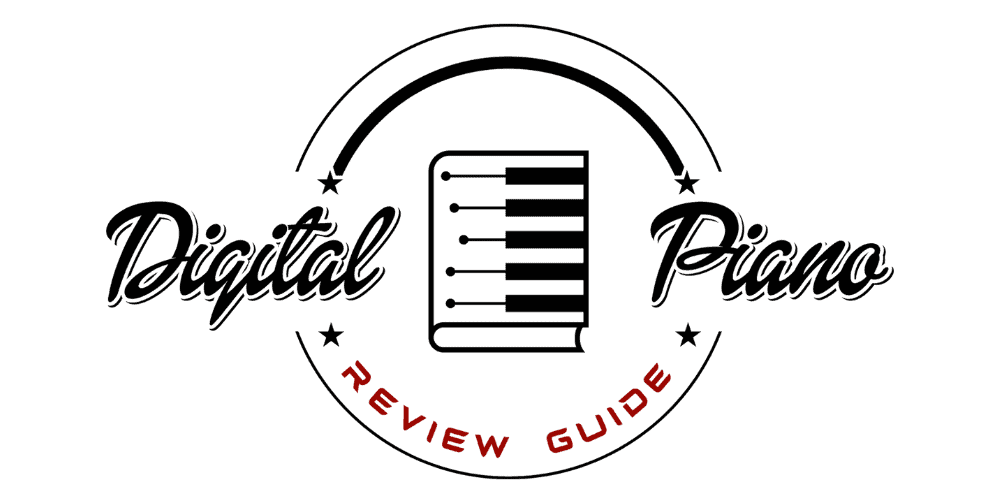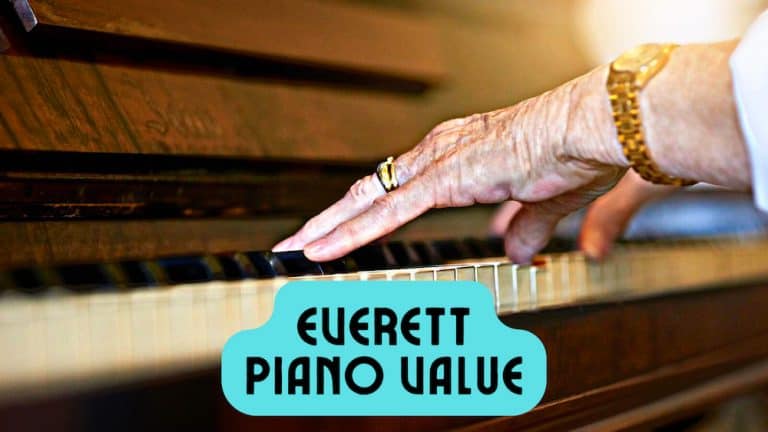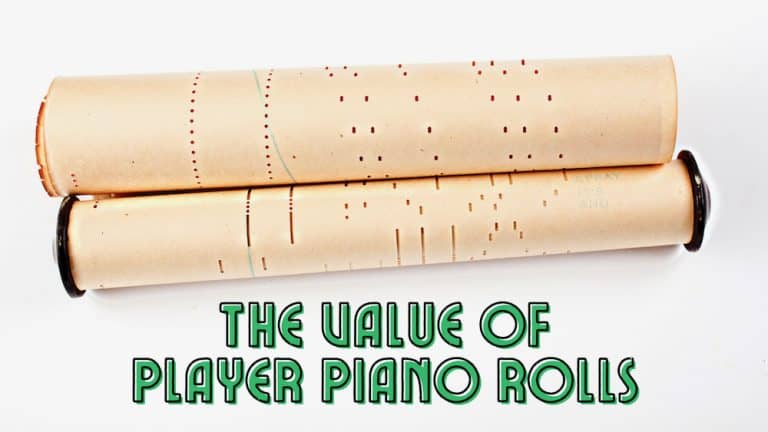How to Assess a Kawai Piano’s Value

If you’re interested in knowing the Kawai piano value of a used instrument you’re looking to buy or sell, you’re in luck. In today’s article, we’ll break down what your Kawai piano is worth based on looking at a variety of Kawai piano’s available for sale on the open market.
Assessing Kawai Piano Value

In an effort to estimate what a Kawai piano is worth, let’s take a moment to see how well some of these pianos are selling on the open market.
1) We begin our showcase with a white finished beauty from The Piano Company out in Leesburg and Dulles, Virginia. This is the Kawai GE20 baby grand piano in very good condition with serial number 2466035. First, the three pictures show that this baby grand had been taken care of in its lifetime, and there are no nicks and scratches on the finish nor key fatigue.
Since the seller didn’t place the year of manufacturing, a clue like the serial number is a plus to search up any database. According to the Kawai website, this baby grand was made in 2003 with the similar serial number listed. Why is the year important? Usually, brands like Kawai are valuable as the pianos age, because they are not made anymore, and a few examples have been ruined due to poor maintenance.
An added plus is a seat cushion. I think most piano players would agree that is a plus, as anyone could testify that a piano bench isn’t a comfortable seat after a few hours.
2) From the Henderson Piano Company in its Lexington store comes a rare 1984 Kawai KG-2D grand piano in high polish rosewood for the low price of $15,900. The original asking price was a whopping $54,995! That is a steal for a rare rosewood finished piano, and for anyone reading this who is interested, check it up before it is gone.
The pictures show a piano with little finish fatigue, and the keys are clean with no damage to them. Nor do I see any fatigue with them. Finally, the insides are in pristine condition, the strings are true. Plus, what’s not to love when the seller is giving a warranty and a matching bench?
3) Another grand piano? Yes indeed. From the Henderson Piano Company in their Lexington showroom comes a 1989 Kawai GE-1 grand piano for the low price of $8,995 from its original new price of $17,995. Finished in satin walnut, this is a beauty for its age. I always adore grand pianos that were well kept, because you get a piano that will appreciate in value as the years go by. With a warranty for five years, this is a great deal for someone looking for a grand piano from a respected company, and doesn’t want to pay the new price of a Kawai.
The pictures are clean and crisp, there’s no damage to the finish or to the keys. No key fatigue, and no string wear. These pianos have been cleaned and well kept! Check these guys out if you’re in the Lexington area.
4) From the Caruso Piano Company is a refurbished Kawai Studio upright piano in St. Lucia blue for $5,790. A unique color for this piano, but it comes from the Caruso’s four-star reconditioned pianos, which is basically making sure that the piano is not just in playable condition, but to a high standard like the new pianos today.
What I liked about this listing is that we have a video of the piano in action, with a dulcet tone that is smooth and clean. In fact, most experts will tell you that Kawai’s tend to have a smoother and subtle tone than the contemporary Yamaha. This is no exception, as this sounds smooth as silk.
As for specifics, the year and manufacturer’s serial number, these details are not in the listing. Luckily, the guys at Caruso Piano Company are happy to discuss the details and the reconditioning process. This is unique, and while some may scoff at the blue, I think it’s fitting for this piano.
5) From Keyboard Concepts comes a 1990 Kawai NS20 upright piano in ebony black for $5,900. The previous example in St. Lucia blue would likely be this in its original condition. Nevertheless, this piano is in beautiful condition. The finish is shiny and polished without any scratches or dents on the piano’s body. The interior, though a small shot, shows us that the piano has been well kept and maintained by the sellers.
We have the serial number as 1951784, for those who are curious to find the exact date of manufacturing. This example, of course, was made in Japan. Although we do not have a video showcasing the piano in action, if you’re a Pasadena local, check this piano out when you have the chance!
6) Out in Frank and Camille’s in New York state comes a Kawai GL-10 Premium baby grand piano for $13,495. Originally, it was priced at $14,495. Again, this Kawai is in great physical condition from the ebony finish to the insides. There is no key fatigue, no chips, the strings are in peak physical shape with no fatigue as well. We have the bench included too, and like the piano, there is no faded finish or scratches from what I see.
While we don’t have the serial number or the year of manufacturing, you can ask the seller to give you those details. Judging by the physical condition and the model, it is still in production, and prices can go up to the $10,000 range.
- You May Also Enjoy: Kimball Piano Value
What is the Average Value of a Kawai Piano?
The average value of a Kawai piano can fall around as low as $5,000 to $30,000, when you’re looking at used and vintage instruments. Generally, the older the piano and the better kept instrument it is, it will command a higher price point over a beaten piano. Like other instruments, pianos depreciate in value a few years after it was new, and then increase in value as the model becomes rare to find once Kawai discontinues a specific model.
After depreciating values, the specific type of piano is a key factor in value. Since grand pianos are larger and made with more moving parts, they will cost more than a baby grand and upright. For averages, a grand piano can fall from $30,000 down to $10,000 depending on its age and condition. Baby grands are slightly lower, commanding from $15,000 down to $8,000; upright pianos are lower, with the best looking and well-kept example clocking in at $10,000 with a cheaper example going as low as $4,000.
Like other pianos, the Kawai will hold in their value because they are a respected company.
Kawai Brand Recognition
As mentioned before, Kawai is a respected company with a pedigree of excellence and quality. Their core philosophy, with the video listed in their website, is to build the perfect piano with the best quality wood and with the help of quality craftsmen. The video in question is a great resource to show buyers the care and expertise it requires to build a Kawai piano.
Koichi Kawai, the founder of the company, began as an apprentice that soon would build his own legacy starting in 1927. Despite facing shortages from the Great Depression, with greater challenges during the Second World War, the Kawai company thrived as Japan rebuilt itself in the post-war economic boom. With 1,500 pianos built in one year by that time, Emperor Hirohito awarded Koichi Kawai with the Blue Ribbon Medal, the first man to receive the award in the musical industry.
Since then, Kawai has become an international icon.
- You May Also Enjoy: Wurlitzer Piano Value
Factors that Affect a Piano’s Value
The value of a Kawai piano will be affected by a series of factors that range from the smallest crack in the body to the largest spot of worn out fatigue in a baby grand. Like any purchasable commodity, a Kawai piano is susceptible to a lower price point if these problems exist or the seller did not mention this in the listing. The key before considering purchasing a piano after reading the description is to contact the seller of any problems the piano may have.
Remember, if the seller doesn’t put in the year but a serial number, that’s the clue to find out the year of manufacturing. If neither is in the description, contact the seller to find out.
A few factors in a piano’s value is the sound. Has the piano been tuned recently? If it hasn’t, that would be an added expense for the buyer after purchase and shipping. You could try to negotiate the price down, but do not keep your hopes up.
The piano’s physical shape is another paramount factor. If the piano has been dropped or experienced damage in its lifetime, it should be mentioned in the description, otherwise that is a large problem that the buyer must deal with. Luckily, most reputable piano sellers have had their pianos refurbished or maintained by their techs, and no piano is usually sold with extensive amounts of damage.
We also recommend looking at the keys. Do the keys jump back to a resting position or do they stick when you play a key? This isn’t a common problem in reputable sellers, but a factor to consider because a piano that doesn’t play well isn’t worth the headache if you don’t have the financial backing.
- You May Also Enjoy: Yamaha Piano Value
How Can I Know the Value of a Kawai?
Besides researching non-stop at your local piano store or on the web, the best way to know the Kawai piano value is to converse with professionals. For instance, if you have a local Kawai dealer near you, I would recommend talking to them because they are experts in the brand and know every pro that the piano has. They may not highlight some flaws, so do keep their advice with a grain of salt.
Talking with tuners and appraisers is probably your best bet in determining the value of a Kawai. The tuner has worked with pianos and has experience, so they will be more than happy to talk on what to avoid and what to buy. They can also point to areas that a specific piano model’s flaws and common problems associated with the model. Like a used car, I would recommend bringing in an experienced piano player, they know pianos because they play with them and know the feel of a great piano versus a bad one.
The appraiser is also another source to talk to when looking for a Kawai, because they researched the market, and if you have a Kawai you’re thinking of selling, they will appraise to give you a price for your piano.
- If this article helped you, please “like” our Digital Piano Review Guide Facebook page!






